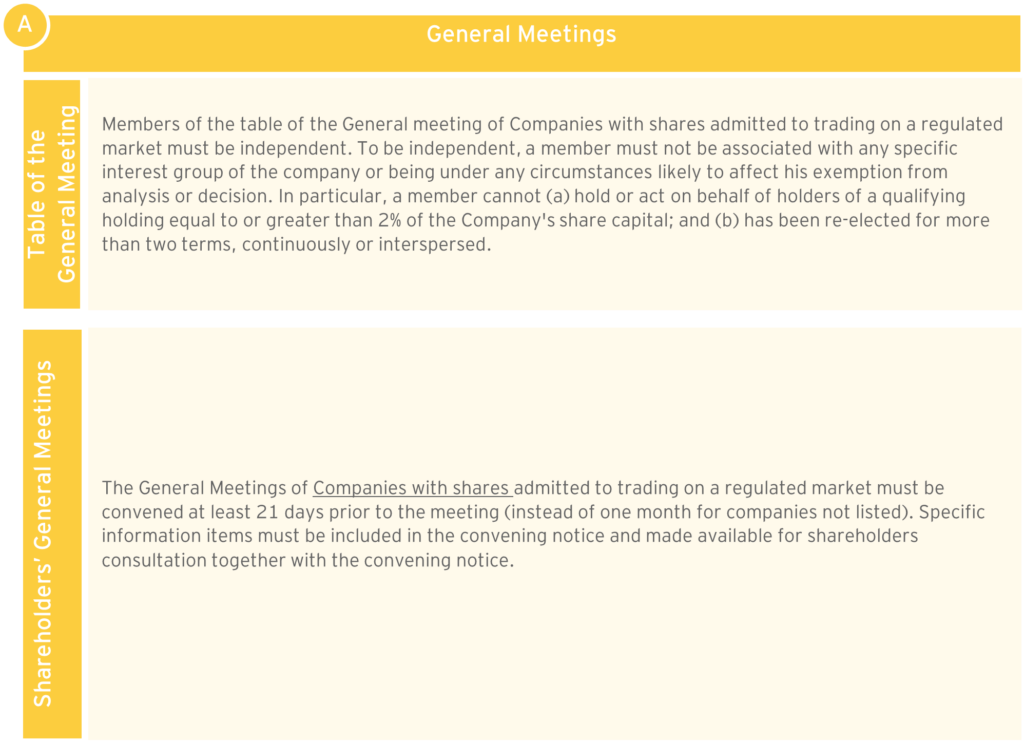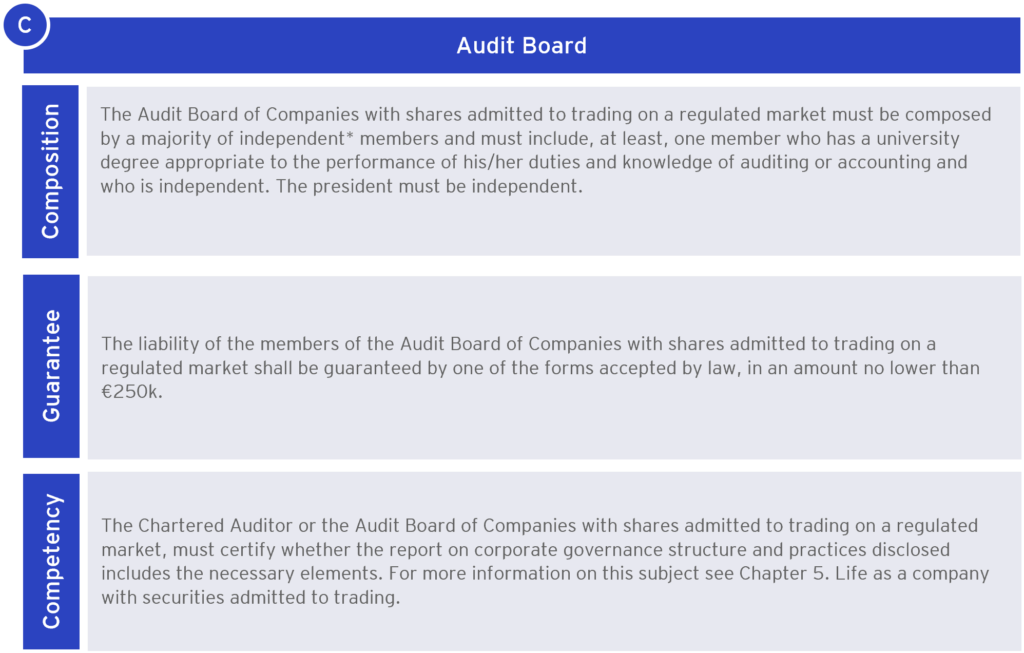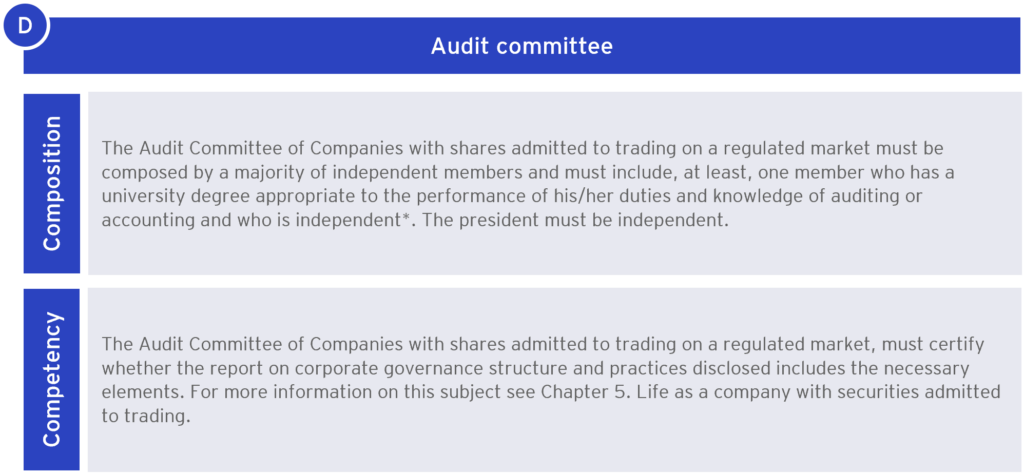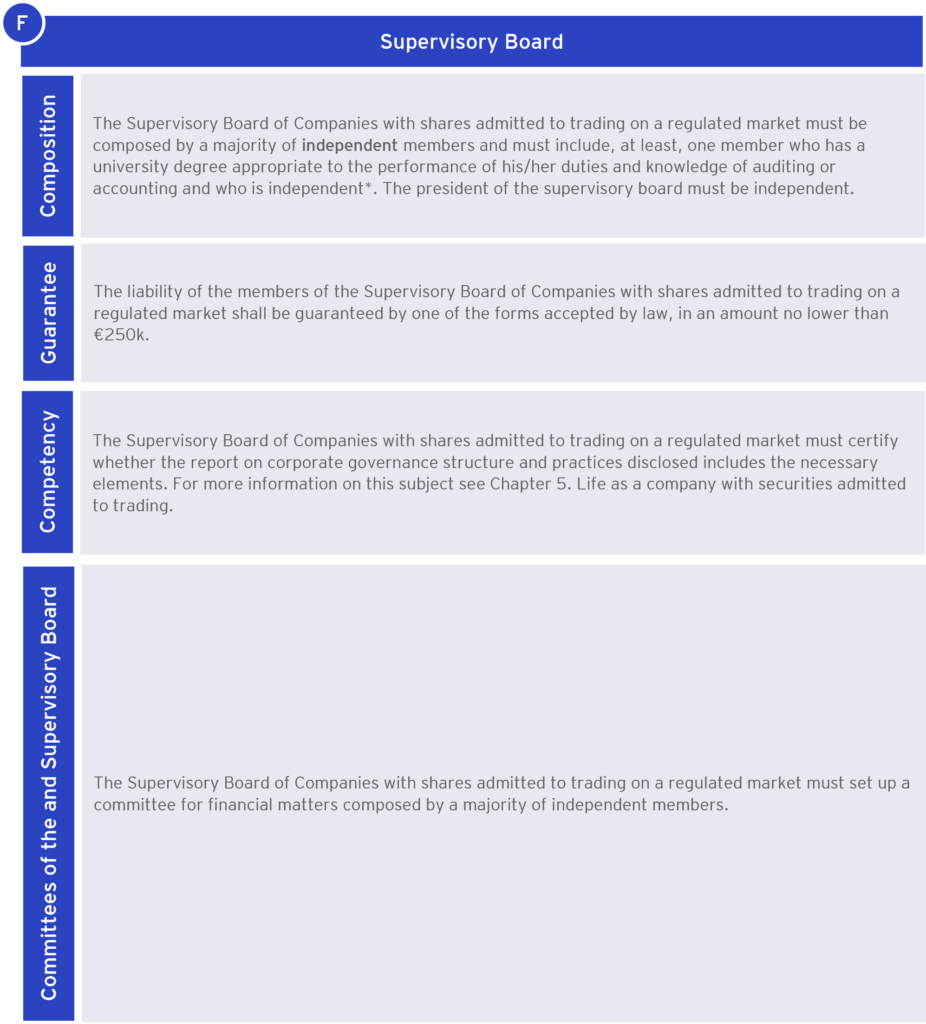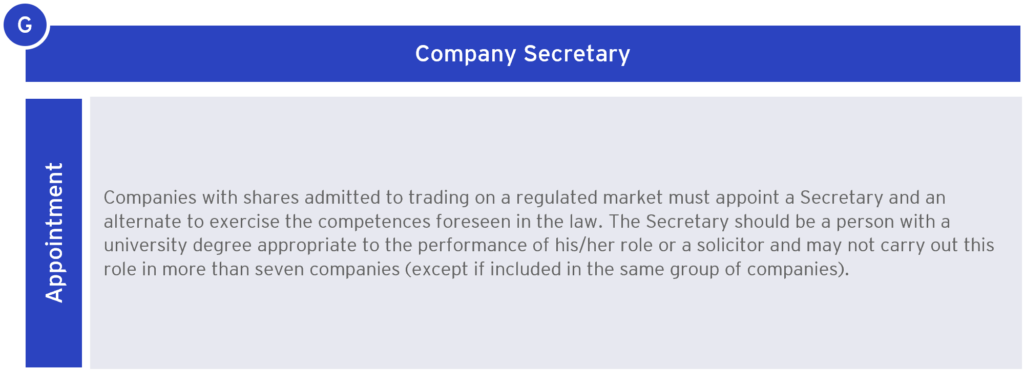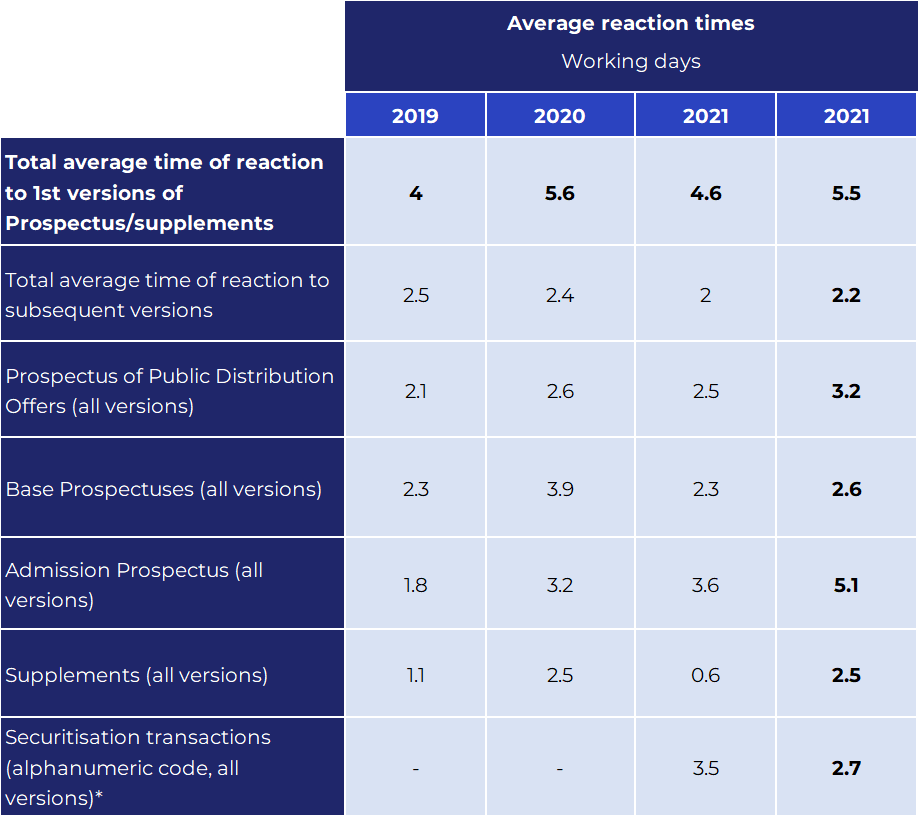Last updated:
The preparation phase may take between 6 to 3 months before finalizing the process of going public. The length of this period depends on several aspects, in particular, the stage of the Company’s development, the governance and internal organization it has already in place.
What are the necessary preparation steps you need to take?
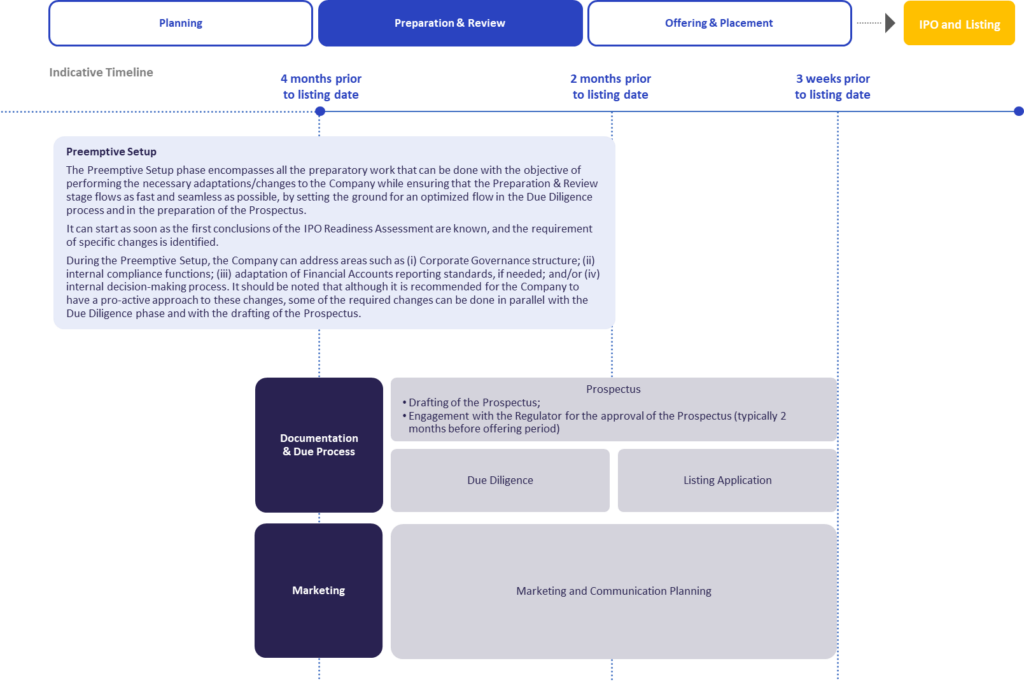
3.1.1.2.1. Preemptive setup
3.1.1.2.1.1. Kick-off meeting
Once all members of the IPO team have been selected, the kick-off meeting brings them together to agree on:
3.1.1.2.1.2. Adapt corporate governance structure and internal compliance functions
How efficient, compliant and accountable is your Company?
Legal form of the Company
It has to be a public limited Company (in Portugal designated as “Sociedade Anónima” or “S.A.”). If this is not case, your Company will have to change its legal form before the IPO.
Corporate Governance structure
Companies with shares admitted to trading on the stock market may adopt any of the 3 types of management and supervision structure for public limited companies. Any of the structures is admissible and on the Portuguese market there are listed companies with the various modalities.
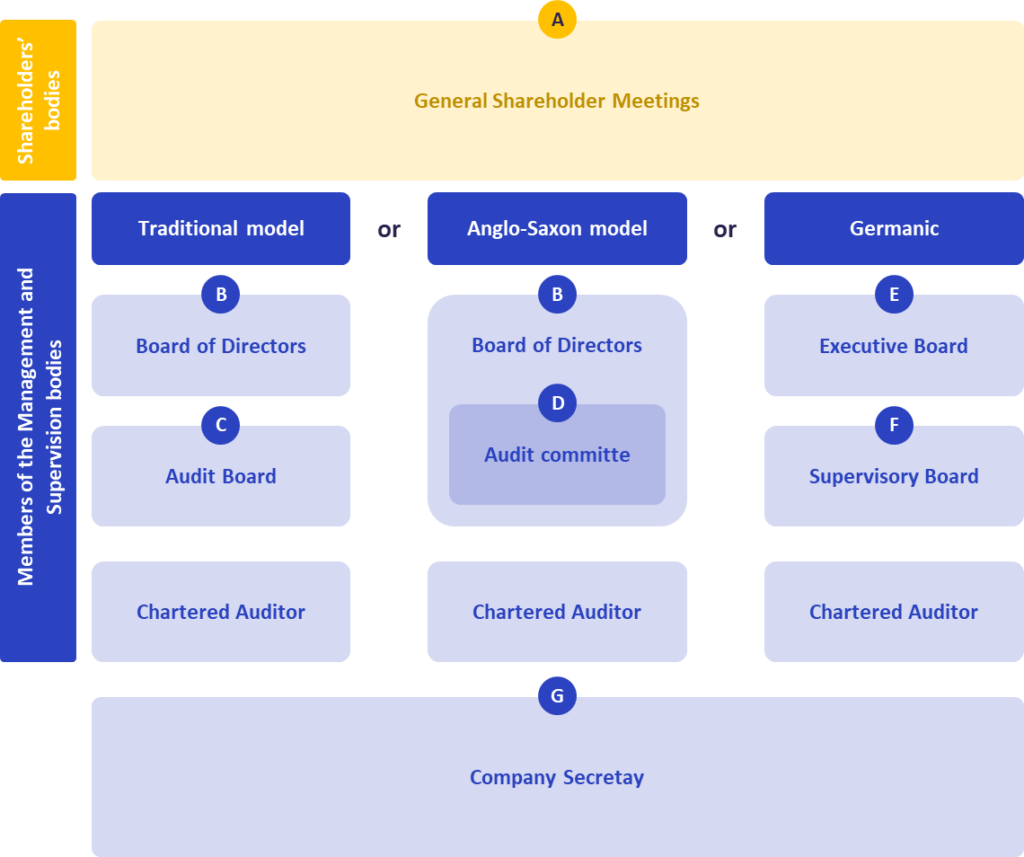
Further information on the corporate governance requirements applicable to Companies with shares admitted to trading on a regulated market is presented upon mouse click of the boxes below.
Many of these corporate governance requirements are not specific for Companies with shares admitted to trading on a regulated market as they also apply to Companies with a large dimension*.
*Companies, that according to their last annual or consolidated accounts, meet at least two of the following three criteria for two consecutive years:
Companies with shares admitted to trading on a regulated market may also have to adapt their organizational structure and functioning to assure the existing legal requirements regarding:
Additionally, Portuguese Companies with shares admitted to trading on a regulated market include a report on corporate governance structure and practices in their Annual Accounts. The existing Corporate Governance Code is part of a self-regulatory approach based on the “comply or explain” principle, according to which companies are expected to follow the Code’s recommendations but have the possibility to deviate from one or more of these recommendations, in some specific circumstances, provided that they set out in their corporate governance report, the circumstances, or reasons for this deviating practice.
Some of these rules and recommendations require companies to make choices that can or should be made explicit in their articles of association. Additionally, new processes/systems may need to be set up to follow those recommendations.
Recommended reading: 5. Life as a company with securities admitted to trading.
Articles of association review
To request admission of shares to trade on the stock exchange, both regulated market and multilateral trading facilities “MTFs”, your Company may need to revise the articles of association to accommodate adaptations to corporate governance, to remove any statutory limits on share transferability and to consider other statutory changes such as foreseeing:
Review of internal functioning and organization
Your Company should also anticipate the rules applicable to listed companies to allocate the necessary resources and put in place the internal compliance functions, processes and systems necessary to guarantee the compliance with those rules.
Recommended reading: 5. Life as a company with securities admitted to trading.
3.1.1.2.1.3. Adapt financial accounts, if necessary
Depending on the market your Company wishes to list its shares, different rules on accounting standards apply.
For example, a listed Company on a regulated market, such as Euronext Lisbon, is required to report financial accounts in compliance with the accounting standards accepted at European level, corresponding to IAS/IFRS or accounting standards considered equivalent to IFRS by the European Commission.
The Company will therefore have to consider the requirements and costs related to adoption of these accounting standards. You might require assistance for converting national accounting standards into IFRS from certified accountants, although the recent trend has been a gradual convergence between the requirements. Although IFRS can be more complex, it presents the advantage of comparability with companies at European level, which promotes Company notoriety towards international and Institutional Investors. Hence, if you need to convert your accounts you can easily be assisted by a professional and this conversion will enable you to benefit from the advantages stated.
Differently, a Company listed on Euronext Growth and Euronext Access has the choice of reporting its accounts in accordance with IFRS, or accounting standards considered equivalent to IFRS by the European Commission, or with the accounting standards applicable in Portugal (i.e. SNC).
3.1.1.2.1.4. Negotiation agreements WITH ADVISORS and Placement Financial Intermediaries
At the beginning of the IPO journey the Company’s management meets with potential IPO partners that may be appointed to support the IPO process and the Company on the life after becoming listed. Negotiations of the agreements with the selected financial and legal advisors and the auditors could extend over this period.
Moreover, your Company may appoint one or more Placement Financial Intermediaries that will be in charge for the distribution of the offered shares and will negotiate and enter with such Placement Financial Intermediary(ies) a placement agreement to regulate the terms and conditions of the distribution services.
Please check below for further information on the different types of placement agreements.
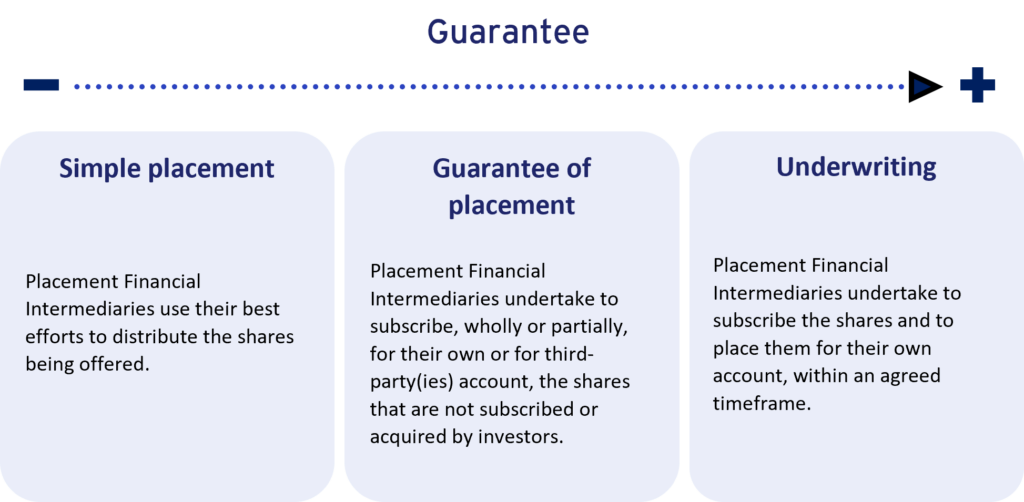
The negotiation of a placement agreement should be start early in the IPO preparation phase. Signing must occur prior to the approval of the Prospectus by the Regulator in case of a public offer.
3.1.1.2.1.5. Internal decision-making process
The decision to go public and related decisions during the IPO journey require the prior approval of corporate resolutions, such as:
The Board of Directors is generally responsible for the entire IPO process and for the approval of the corporate decisions, except the share capital increase that requires the approval of the General Meeting (unless the Board is entitled by the Company’s by-laws to do so).
3.1.1.2.1.6. Engagement with the Regulator, the Stock Exchange and the Central Securities Depository
The applications for the Prospectus approval by the Regulator (in Portugal, the CMVM), for the listing approval by the Stock Market Operator (in Portugal, Euronext Lisbon) as well as for the registration of the Company’s shares with the Central Securities Depository (in Portugal, Euronext Securities Porto) should be filed with a set of legal and financial documents set out in the applicable laws and regulations.
It is recommended that the Company, and its advisors, engage with these entities (Regulator, Stock Market Operator and Central Securities Depository) in an early stage of the IPO journey for a smooth and timely approval procedure.
3.1.1.2.2. Due Diligence
A due diligence process is desirable to be performed, including scrutiny of the Company’s financial, commercial, legal, accounting, tax and other affairs. This due diligence is conducted by the Company with the assistance of legal counsels.
This process is intended to provide deep knowledge of the Company, allowing it to correct any issue before the offering of its shares and supporting it with strengthening of its business and corporate governance practices, as well as ensuring that the required information about the Company will be disclosed in the Prospectus (for further information see the below section ‘3.1.1.2.3. Prospectus’). Throughout the IPO process, additional due diligence sessions may be planned at each key milestone to ensure that the information disclosed is up to date.
Why should a Due Diligence be performed in the context of an IPO?
The purpose of conducting a Due Diligence process in the context of an IPO is to:
3.1.1.2.3. Prospectus
If you decide to proceed with a Public Offering of shares addressed to the general public and/or apply for the admission of the offered shares to a regulated market you will have to prepare and disclose to the public a Prospectus approved by the Regulator, drafted in accordance with the EU Prospectus Regulation.
A Prospectus will not be required for a Public Offer if:
The Prospectus is a legal document, which provides to potential investors and other stakeholders (e.g. analysts) all relevantinformation that may affect the investment decision. The Prospectus includes legal, financial (both historical and prospective financial information) and commercial information with content adapted to the Company’s profile and shares.
This document enables investors to clearly assess the Company’s patrimony, financial situation, results, and prospects. The Prospectus must be complete, understandable, and consistent. Once approved by the Regulator, it will be published prior to the offer of the shares or admission to trading.
The Prospectus may be drafted as a single document or as separate documents, dividing the required into:
Summary*
The summary should be drawn up in a standardised format and in a concise manner, using simple language to make it easier to understand.
The summary should contain i) key information regarding the risks of the Issuer and the shares that are being offered, ii) the offer’s terms and conditions and the reasons for the offer and the allocation of revenues.
*The summary may not be required.
Registration Document
Document presenting the Issuer, its sector and business activities, including risk factors, assets and liabilities, accounting and financial information, management and corporate governance, among others. It contains information that will subsequently be shared with investors and analysts, ensuring fair and equal diffusion to all parties.
Equities Note
Document prepared by the Company and its advisors, defining the main terms of the transaction and information on the shares to be offered and/or subject to the request for admission to trading, including the number of shares to be issued, the price range, a timetable for the subscription period, and the use of proceeds.
What is an EU Growth Prospectus?
Considering the specificities of the different types of securities, issuers, offers and admissions, the EU Prospectus Regulation foresees different types of Prospectus, such as the EU Growth Prospectus. This is a simplified Prospectus for certain Companies, with limited number of pages and less information, reducing the administrative burden of the process and associated costs, making it easier for these companies to access the capital markets. The EU Growth Prospectus may be used regardless of the market segment in which the IPO will take place.
In what context can a company choose to draw up an EU Growth Prospectus?
Companies which comply with the guidelines below can opt for the simplified EU Growth Prospectus, provided that they do not have shares admitted to trading on a regulated market:
► Companies which can be classified as SMEs, i.e. according to their last annual or consolidated accounts, they meet at least two of the following three criteria:
· an average headcount under 250;
· total assets recorded in the Balance Sheet do not exceed €43m;
· annual net turnover does not exceed €50m.
► Companies, other than SMEs, whose shares are traded or are to be traded on an SME growth market, provided that those companies had an average market capitalisation of less than €500m on the basis of end-year quotes for the three calendar years prior.
► Companies, with the exception of those referred to above, whose shares total consideration in the EU does not exceed €20m calculated over a period of 12 months, and provided that such companies have no shares traded on an MTF and have an average number of employees during the previous financial year which does not exceed 499.
What is EU passporting of Prospectus?
As EU Prospectus rules are similar in all Member States, once a Prospectus has been approved in one EU member state, it is valid throughout the EU (passport for the prospectus). This represents an important simplification for Companies since it allows Companies to launch offers or admit to trading instruments in several EU countries, resorting to the same Prospectus, provided that the Company requests the Regulator approving the Prospectus to send it (passport) to the Regulators of the relevant Member States.
What is CMVM’s approach?
CMVM recognizes that streamlining the conditions for issuers to access financing through capital markets, together with ensuring high quality standards for information to be provided to investors, generate mutual trust and are a key element for the development of the Portuguese capital markets..
In the context of public offers or admission to trading processes, CMVM assumes as a priority the commitment with specific approval dates and the agility in the times of analysis of prospectus, recognizing the importance of calendars’ predictability as an essential condition for the smooth running of operations.
Predictability & Timeline
– Interactions and approval according to a calendar previously agreed with the issuer;
– Clear comments and understandings (in writing) – focus on the crucial information for investors;
– Quick reactions to drafts (commitment and track record [link]).
CMVM assumes the Issuer´s commitment to complete reactions, for the benefit of the procedure.
Availability & Agility
– Kick off meeting (if requested) before preparing and submitting the prospectus and additional meetings (as needed);
– Credible and responsive process, coupled with timely informal interactions.
Prospectus process
Validity
The Prospectus for a Public Offering for distribution remains valid for a 12-month period from the date of its approval by the CMVM, and provided the Prospectus is updated, accordingly with any supplements that may be required.
Supplements
It may occur that in the time between the approval of the Prospectus and the time when trading on a regulated market begins it occurs, or is detected, a new event, a material mistake, or a material inaccuracy relating to the information included in a Prospectus, which may affect the valuation of the shares.
In these cases, the Company must issue a supplement to the Prospectus with the relevant information and request approval of the document from CMVM. The supplement approval process takes into account the fact that it arises at the specific time where CMVM’s fast reaction is off upmost importance to mitigate the potential disruption of such event. Therefore, supplements are approved very quickly after the emergence of a triggering event, allowing investors who have already presented subscription orders the right to withdraw them.
Investors who accepted the offer prior to the disclosure of the supplement have the right to withdraw their acceptance within not less than three working days following the disclosure of the supplement, provided that the significant new factor, material mistake or material inaccuracy arose or was noted before the closing of the offer period. That period may be extended by the Company. The final date to exercise the right of withdrawal must be stated in the supplement.
3.1.1.2.4. Listing application
In order for a Company’s shares to be admitted to trading, a request for the listing of the shares must be submitted to the Stock Market Operator. In Portugal, the operator is Euronext Lisbon, who will verify compliance with the general requirements for admission to trading.
Recommended reading: 3.1.1.1.2. Eligibility Criteria.
In case of listing in Portuguese markets, to kick-off the admission to trading process, the Company first meets with Euronext Lisbon to present the listing project and agree on the respective timetable.
The Company must appoint a Listing Agent (Euronext Lisbon) and a Listing Sponsor (Euronext Growth and Euronext Access) who will assist and guide the Company with the admission to trading and also help the Company to prepare the application form and all the documentation that must be submitted to Euronext Lisbon.
At the same time as the proceedings above, the Company needs to register its shares with the Portuguese Centralised System of Registration of Securities managed by Euronext Securities Porto.
Decision
Euronext will decide on the application for admission to listing within a maximum period of 30 trading days (1 month for Euronext Growth and Euronext Access) after receiving the required documentation, unless agreed otherwise by the applicant Company and Euronext Lisbon.
In the event of a Public Offering of shares, the admission to trading shall become effective only after the assessment of results and settlement of the offering.
3.1.1.2.5. Marketing and Communication Planning
Marketing and Communication strategy throughout the IPO process is crucial as it enables the Company to manage investor relations, generate interest and mitigate perceived uncertainty.
In the context of an IPO, it is of paramount importance that the Company, with the assistance of its advisors, diligently defines how to present and promote the offer to potential investors.
While the Prospectus is being drafted, a marketing strategy is designed to create investor interest and momentum. The Company and its advisors draw up a presentation to use in meetings with investors and equity research analysts, which includes exclusively contents presented in the Prospectus but in a more focused manner and directed to the target investors of such meetings.
The core marketing documents, such as the slideshow, the IPO website, press releases and other communication materials, may all be adjusted throughout the preparation phase of the IPO process. Documents comprising advertising content are subject to prior approval by the CMVM.
The marketing strategy has a great impact in managing investor relations; generating interest and mitigating perceived uncertainty.
It should be highlighted that material information provided, directly or indirectly, by the Company to Institutional Investors or special categories of investors, including information disseminated at meetings, as well as information provided to financial analysts shall be disclosed to all investors to whom the offer is addressed.
Until the offer is made public, all the parties involved in its preparation need to:
As from the moment the offer is made public, all the parties involved in releasing information regarding the offer need to:
Additionally, when conducting pre-offering marketing activities, all the parties involved in the Offer need to assure the compliance with the EU Market Abuse Regulation (“MAR”) in what respects disclosure of inside information the context of a market sounding.
Recommended reading: 5. Life as a company with securities admitted to trading.
3.1.1.2.6. Early-look meetings with investors
It may be necessary, considering the offer structure, to prepare the Company’s Management for any meetings with investors (either internally or through a communication agency or other advisors).
These one-on-one confidential early-look meetings between Management and targeted investors aim to introduce the Company, explain its business model, measure the initial market sentiment on the Company’s equity story, ask for the investors’ feedback on several matters, , the IPO and the share price, to understand how the market will assess and value the Company, and, most importantly, to measure the adhesion by investors.
These early-look meetings allow an early assessment of the potential success of the IPO. Based on the potential interest noticed at these meetings, which are spread out over time, the Company may adjust its IPO project, and can postpone or even exit the process without a substantial financial commitment at this stage.
If the meetings generate a formal commitment of acceptance of the Offer, this information will appear in the Prospectus.
3.1.1.2.7. Meetings with Equity Research Analysts
While the Prospectus is being drafted, the Company and its advisors may prepare a management presentation of the Company with equity research analysts to collect additional information. This feedback also allows the advisors to measure market sentiment and subsequently to define, together with the Company’s Board, the share price range.
